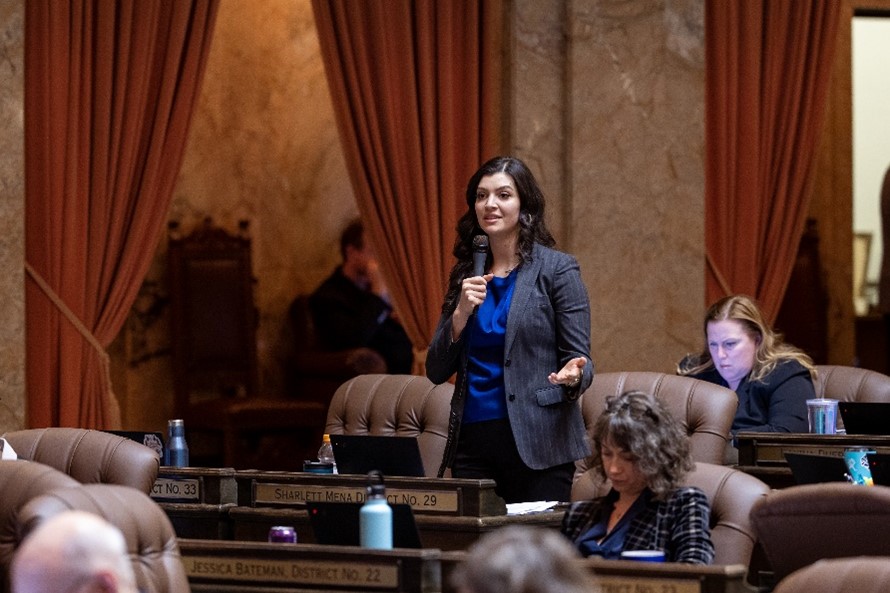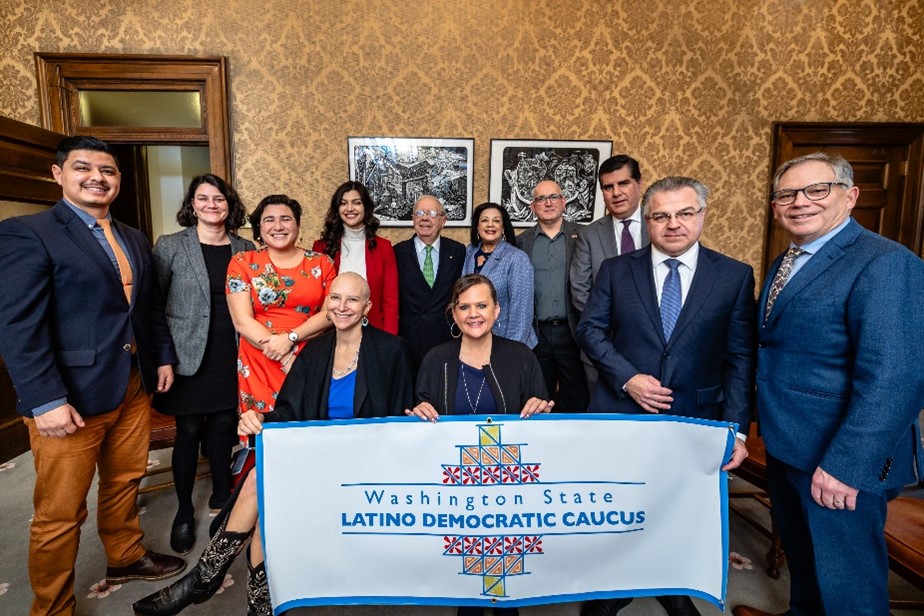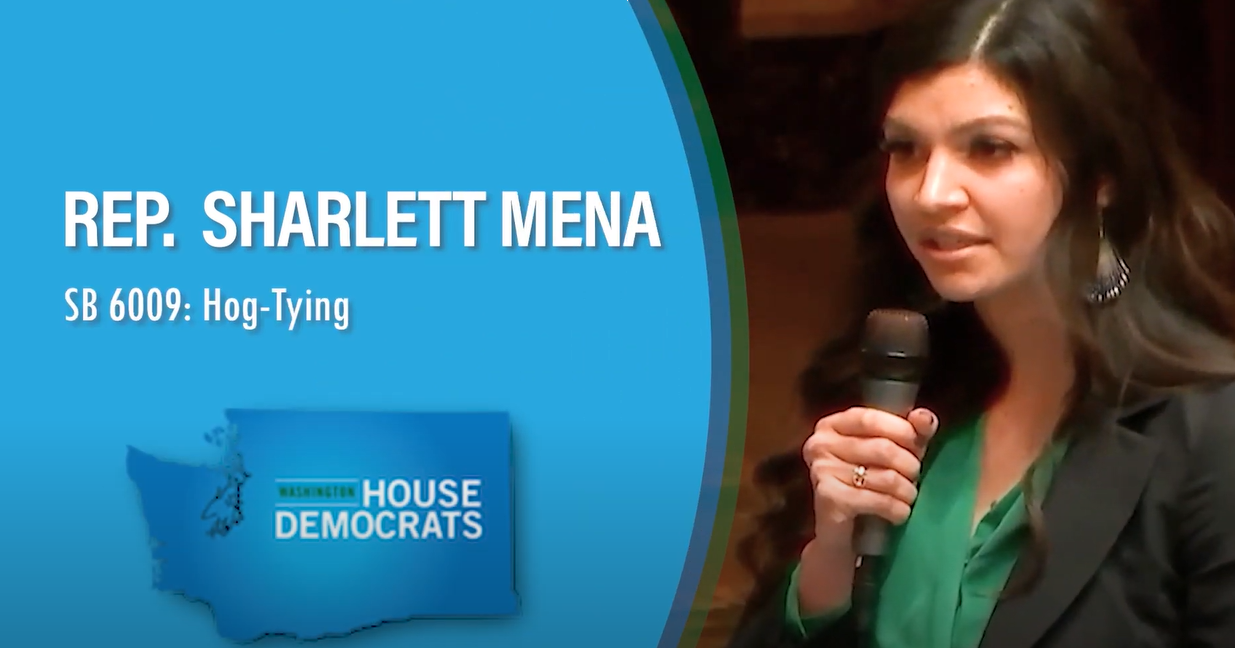Dear Friends and Neighbors,
Happy Leap Day! Since I last wrote, the House of Representatives has introduced three supplemental budgets for 2024: the capital/construction, transportation, and operating budgets. One of my bills, House Bill 1905 passed the Senate earlier this week, and another bill, HB 2000 is one step closer to the governor’s desk as it awaits a full vote before the Senate.
Tomorrow, March 1, marks another key legislative deadline. Opposite House Cutoff is the last day for bills the be voted out of the opposite chamber to have a chance of making it to the governor’s desk. As of yesterday, the House has passed 341 bills, with 183 being unanimous, and 255 bills receiving a strong bipartisan vote with over 80 votes in favor.

There are seven days remaining in the legislative session and a lot of work remains. In this upcoming week, we will head to the floor of the House to debate legislation until Sine-Die.
Video Update
Senate Bill 6009/House Bill 2414 Prohibits peace officers from hog-tying a person. I’m proud to share that SB 6009 passed the House on February 28th and now heads to Senate for concurrence.
Once enacted, I think we meaningfully move away from dangerous and dehumanizing police practices toward alternatives that build trust and ensure the safety of all communities. To learn more about SB 6009, please watch my remarks upon final passage from the House. You can also learn more about SB 6009 in this recent Tacoma News Tribune article and Seattle Times article.
Learning From the Past
As you likely know, there is a proposed project in South Tacoma to build one of the largest warehouses in the world. The project would bring significant truck traffic to the area and be developed on a large Superfund cleanup site.
Many in our community have expressed concerns about increased air and noise pollution. Data demonstrates residents in South Tacoma already have a shorter life expectancy six years shorter than other residents in Pierce County. The concerns and appeals to permitting raised by various agencies and community members reiterate the historical context of environmental racism and unequal distribution of environmental burdens.
One of my bills, HB 2070, would help put an end to developments that would have such an impact. Under the CURB Act, projects would under the State Environmental Policy Act would be required to conduct an environmental justice impact review in communities that rank a seven or higher on the state’s Environmental Health Disparities map.
Our communities shouldn’t have to continue to pay the highest price repeatedly. Learn more about HB 2070 in this recent Seattle Times article.
Budget Proposal Recap
Construction: The proposed $1.3 billion construction budget prioritizes homelessness, affordable housing, early learning centers, and mental health facilities. With inclusivity in mind, partnerships with tribal healthcare extend services.
Funding comes from diverse sources, including the Climate Commitment Act, which supports clean energy and environmental initiatives, demonstrating the budget’s commitment to both people and the environment. This investment acknowledges the interconnectedness of Washington’s challenges, aiming to build a stronger and healthier state for all.
Operating: Building on economic recovery, the operating budget bolsters existing investments and adds new ones in areas like education, childcare, and affordable housing. It aims to help families across various stages, from students to parents with childcare needs, and young adults pursuing higher education. Additionally, the proposal invests in our shared future, protecting clean air and water, funding childcare with capital gains tax revenue, and ensuring quality long-term care. The House will negotiate with the Senate in the coming weeks to reach a final budget reflecting shared values and strengthening Washington communities.
Transportation: A $14.3 billion supplemental transportation budge tackles infrastructure needs, ferry upgrades, and rising traffic fatalities. Federal funds, Climate Commitment Act auctions, and existing programs fueled the rise, aiming to handle construction costs, maintain aging infrastructure, and improve safety. Infrastructure gains priority with bridge replacements, fish passage repairs, and highway maintenance funding. Ferries receive significant allocations for construction, maintenance, and workforce development, including funding for new hybrid-electric models.
Climate action gets a $340 million boost, specifically targeting underserved and tribal communities, while funding clean transportation initiatives. Recognizing the 2023 traffic fatality spike, the budget allocates funds for traffic management, law enforcement, and infrastructure improvements. Speed camera considerations for construction zones and cities are also underway. This budget reflects the state’s commitment to tackling transportation challenges, promoting clean options, and ensuring safer road.

I’m also proud to share that I’ve been working with my colleagues in the Latino Democratic Caucus to advance equitable and just House Democratic Caucus priorities on education, addressing the fentanyl crisis, expanding housing options, providing economic support and stability for families, and protecting the environment.
Sincerely,

Sharlett Mena
State Representative
29th District

